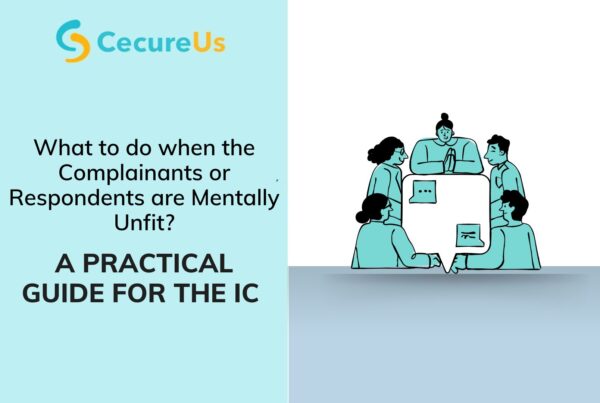When an employee is subjected to sexual harassment at work, it can be a humiliating and traumatic experience. The victims may be feeling uneasy and disturbed, but they may also be terrified. They may want to tell someone about the sexual harassment but are afraid of the backlash or retaliation. What if everyone comes to know about it? What will people think? These insecurities and fear hold them back from speaking out. For the victim of sexual harassment, assuring confidentiality gives them the confidence that what is said will not become a grapevine.
The Prevention of Sexual Harassment or PoSH Act ensures that no one shall have to negotiate with their liberty to file a sexual harassment complaint and that one shall be protected from any backlash or retaliation if they raise their voice against misconduct or sexual harassment in the workplace.
CONFIDENTIALITY IN PoSH
It is sad but true that instead of the perpetrator, the victim of sexual harassment fears more because the victim feels that reporting against the culprit, even under the PoSH Act, might cost them their job, they may have to answer uncomfortable questions from their colleagues, and face judgmental eyes while walking through the corridors.
But to counter these insecurities, the PoSH Act has introduced confidentiality clauses to ensure that no victim of sexual harassment bargains their privacy to receive justice under the PoSH law. Confidentiality suggests that the informer has given information in complete trust and is seeking protection under the PoSH Act.
Section 16 of the PoSH Act states that:-
Prohibition of publication or making known the contents of complaint and inquiry proceedings. Notwithstanding anything contained in the Right to Information Act, 2005 (22 of 2005), the contents of the complaint made under section 9, the identity and addresses of the aggrieved woman or victim, respondent, and witnesses, or any information relating to conciliation and inquiry proceedings, recommendations of the Internal Committee or the Local Committee, as the case may be, and the action taken by the employer or the District Officer under the provisions of the PoSH Act shall not be published, communicated, or made known, to the public, press, and media in any manner.
Provided that information may be disseminated regarding the justice secured to any victim of sexual harassment under this PoSH Act without disclosing the name, address, identity, or any other particulars that lead to the identification of the victim/aggrieved woman and witnesses.
In the case of Vk Bhosale VS The National Bank for Agriculture and Rural Development, the court reinstated the principle of confidentiality under the PoSH Act. In this case, the matter revolves around an RTI application by an appellant seeking a copy regarding an enquiry on a complaint made on sexual harassment, which was conducted by the internal women’s committee. Apart from that, the appellant party also asked for several other documents, which were confidential.
The CPIO, The Central Public Information Officer, rejected the request and denied the information under Section 8 (1) (j) of the RTI Act and cited section 16 of the PoSH Act.
As the proceedings of the judicial hearing proceeded, it was observed that information that the appellant sought was exempted from being disclosed to any third party under section 8(1)(j) of the RTI Act. There was no reason why such sensitive information should be shared with anyone. Also, the panel decided that just because the RTI application was filed by the appellant, for any reason whatsoever, this information should not be provided to him in his capacity as the section 16 of the RTI act clearly states that providing any such information would be a violation of the promise of confidentiality of the PoSH Act to the victim.
Hence the decision of the respondents to deny the information to the appellant was upheld. The appeal was rejected by the judicial bench.
STAKEHOLDERS OF THIS INFORMATION
According to the confidentiality clause of the PoSH Act, sensitive information of any kind should not be provided to anyone. The PoSH Act categorically states that such information is prohibited from being disclosed to anyone, not even fellow employees.
Only the members of IC should have this information regarding sexual harassment to act upon it and meet the ends of justice. As we read in the above case law, no individual shall receive this information of sexual harassment, or details of the victim, even if they are members of top management.
BREACH OF CONFIDENTIALITY
Section 17 of the PoSH Act addresses the consequences if anyone (Internal committee, HR, or management) breaches the trust of confidentiality.
Section 17 of the PoSH Act states that:-
Where any person entrusted with the duty to handle or deal with the sexual harassment complaint, inquiry, any recommendations, or action taken under the provisions of this Act contravenes the provisions of section 16, and he shall be liable for a penalty by the conditions of the service rules applicable to the victim or where no such service rules exist, in such manner as may be prescribed.
As per the service rules applicable, the employer must collect Rs.5,000/- as a repercussion of breaching the trust of the binding contract of the PoSH Act.
EXCEPTION
But there also lies an exception in which there is the dissemination of information about the justice obtained without revealing the name, location, identification, or other personal data of the victim, complainant, or witnesses.
This exemption was recently upheld in the case of Praveen Bhatt v/s Union of India and Others. In this case, the court gave a broad interpretation of section 16 of the PoSH Act and, while explaining it, also stressed the exceptions of this section.
The court stated that sensitive information such as the identity and addresses of the persons mentioned therein and any information relating to conciliation and inquiry proceedings, or even the recommendations made in such proceedings by various committees and the action taken by the employer or by any statutory authority shall not be published, communicated or made known to the public using press or media in any manner whatsoever.
This section of the PoSH Act prohibits publishing any material information about the victim, the case, or its judicial proceedings. It also forbids the knowledge from being brought into the public domain, either by the press or media, when the judicial proceedings abide by the PoSH Act requisites.
The section neither contemplates nor prohibits consideration of the material in the manner provided under the law in a judicial proceeding, especially when the issue involved in the judicial proceedings warrants taking note of the proceedings held, as was the question in the present judicial case.
From this case law, it can be interpreted that The PoSH Act simply forbids the press or media from bringing material facts and details into the public domain while the proceedings of the sexual harassment case are underway. The Act does not exclude or forbid the consideration of the material for judicial inquiry where such rumination is needed.
CONCLUSION
Therefore, it would be just to say that the PoSH Act does not compromise the victim’s identity. The PoSH Act was enacted to curb the incidents of sexual harassment at workplaces. Each section of it lives up to the very purpose for which this Act was incorporated.
In case of any clarifications regarding PoSH Act confidentiality, you may leave your comments below or connect with us through connect@cecureus.com.
ABOUT THE AUTHOR
Hemansh Tandon is a fourth-year law student from Indraprastha University. He is an avid reader and has a keen interest in writing prose and verses.
REFERENCES
- Praveen Bhatt Vs. Union of India and Ors on 09 January, 2020 – Legitquest
- https://indiankanoon.org/
- HANDBOOK On Sexual Harassment of Women at Workplace for Employers / Institutions / Organisations/ Internal Complaints Committee / Local Complaints Committee. ISSUED by the ministry of Women and Child Development
For more information on Prevention of Sexual Harassment(POSH), EAP (Employee Assistance Programs), D&I (Diversity and Inclusion) offerings by CecureUs , please contact connect@cecureus.com or call us at +91-7200500221





Are victims prohibited from releasing this information too? If the confidentiality is victims safety then why are victims asked go sign a NDA?